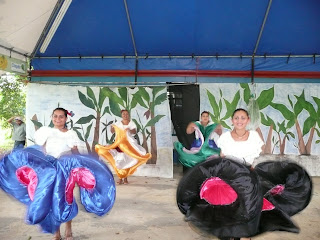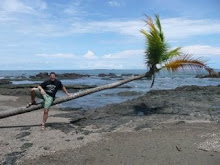





As you can see above, these are few pictures of The Chiquita Banana Show. It was kinda of an awkward show not only because they all spoke Spanish and I had no idea what they were saying, but also because they pulled us out of the audience to dance with them. However, it was a fun show to watch. Also, while we were there they offered us all packets full of information about Chiquita and the business industry in Costa Rica.
First, I would like to start out with a brief history of Chiquita. Well, in 1899, United Fruit Company became an established corporation. Then, in 1903, the were listed on the New York Stock Exchange. However, it was not until 1944 that the name Chiquita, the Miss Chiquita character, and the jingle all came about. It is interesting to note here that Chiquita actually means little girl. Finally, there were two huge events that occured during the 1960's that will impact the company forever. First, they began to use cardboard boxes for shipping which allowed for protection between locations. Second, they began to sell in Europe which opened up a whole new market. However, I want to focus more social responsibiliy & environmental responsibility.
According to Chiquita, all of their Latin American farms conform to certain standards, which includes: no child labor, safe working conditions, no harsh treatment, maximum of 48 hours a week, and compensation meets the legal minimum. While visiting the plantation, all of those requirements were being met. However, it is important to address what the minimum wage in Costa Rica is. Currently, Chiquita is paying their employees $13 a day, which is 50% greater than most plantations in Costa Rica. That fact truly put it in perspective for me to see how hard these people were working for the amount of money they were making. I am truly blessed with the opportunities that I have been given.
I also wanted to address the environmental aspect as well. According to Chiquita, their farms concorm to strict standards such as: minimal pesticide use, protection of wildlife, conservation of water and soil, environmental education, fair pay, safe working conditions, and no tolerance for deforestation. While must of these issues are important, that statement continues to show me that Chiquita is still not ready to become sustainable. For example, they specifically mention minimal pesticide use. If there is no demand for another solution to this big problem, then it will never happen. Also, as I mentioned in a previous blog, they continue to waste water and release them into the environement with harmful chemicals. However, they are making strides.
The company has planted at least one million trees along rivers, lakes, roads and in residential and industrial areas to try and help offset their actions that are harming to the environment. Also, at Chiquita they minimize the water that contains pesticides from spreading unlike many other banana plantations. Even though they are not perfect, I believe that they realize that sustainability is important and they are making steps to become more environmentally friendly. Overall, it is not going to help the environment if only one company makes a change, we must all make a change to become more sustainable.
Information from: Chiquita

No comments:
Post a Comment